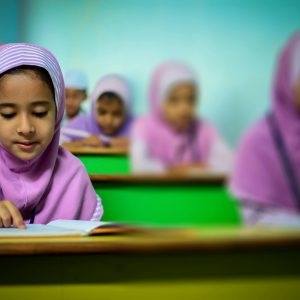Trump-inspired anti-Muslim rhetoric fuels France-Algeria tensions
Far-right French politicians, emboldened by Trump’s policies, push for punitive measures against Algeria
ALGIERS, Algeria (MNTV) — Far-right and hard-right political figures in France, inspired by U.S. President Donald Trump’s aggressive immigration policies, are urging President Emmanuel Macron to take punitive actions against Algeria.
The move is escalating tensions between the two nations, according to Algerian daily TSA.
The controversy erupted after Algeria refused to accept the forced deportation of one of its nationals from France.
Far-right politicians, citing Trump’s swift sanctions against Colombia for a similar refusal, are demanding retaliatory measures such as freezing development aid, suspending visas, and imposing customs duties on Algerian products.
Interior Minister Bruno Retailleau has been a leading voice, accusing Algeria of attempting to “humiliate France” and urging Macron to use “all available means” to assert strength. Other prominent figures, including MEPs Florian Philippot and Sarah Knafo, have echoed these calls, framing the issue as a matter of national pride.
Charles Prats, an immigration and social fraud expert, praised Trump’s approach as a model for France, emphasizing the need for stringent measures. However, analysts caution that the U.S.-Colombia and France-Algeria relationships are fundamentally different, with Algeria dismissing the threats as insignificant.
Algerian officials have downplayed the impact of potential sanctions, noting that development aid is minimal and a 1968 bilateral immigration agreement holds little practical weight. Past French attempts to use visa restrictions as leverage have also failed to yield results.
Critics argue the anti-Algerian campaign is part of a broader Islamophobic agenda, exploiting nationalist sentiment for political gain. They warn that inflammatory rhetoric risks further straining relations and call for diplomatic solutions instead.
As tensions rise, advocates for dialogue stress the importance of cooperation, highlighting the deep economic and historical ties between France and Algeria that make confrontation counterproductive.
Bias against Algerians in France
The current political rhetoric is not an isolated incident but part of a long-standing pattern of bias against Algerians in France. Algerians, who make up a significant portion of France’s Muslim population, have historically faced discrimination in housing, employment, and education.
Reports from human rights organizations and academic studies have documented systemic inequalities, with Algerians often stereotyped as “unassimilated” or “threatening” to French values.
In recent years, anti-Algerian sentiment has been exacerbated by far-right narratives linking immigration to crime and terrorism. Politicians like Marine Le Pen have repeatedly targeted Algerians in their campaigns, accusing them of exploiting France’s welfare system and failing to integrate.
These claims, often unsupported by data, have fueled public hostility and contributed to a rise in hate crimes against Muslims and North Africans.
The Algerian community has also been disproportionately affected by France’s controversial secularism laws, such as the 2004 ban on religious symbols in schools and the 2010 prohibition on face-covering veils.
Critics argue these laws disproportionately target Muslim women of Algerian descent, further marginalizing the community.
Despite these challenges, Algerians in France have played a vital role in the country’s cultural and economic fabric. From contributions to the arts and sciences to their presence in key industries, the Algerian diaspora has been an integral part of French society.
However, the persistent bias and recent political rhetoric threaten to undermine this relationship, deepening divisions and fostering resentment on both sides.
As France grapples with its colonial past and evolving identity, the treatment of Algerians remains a litmus test for the nation’s commitment to equality and inclusion. Without meaningful dialogue and policy reforms, the cycle of discrimination and tension is likely to persist, with far-reaching consequences for both countries.







